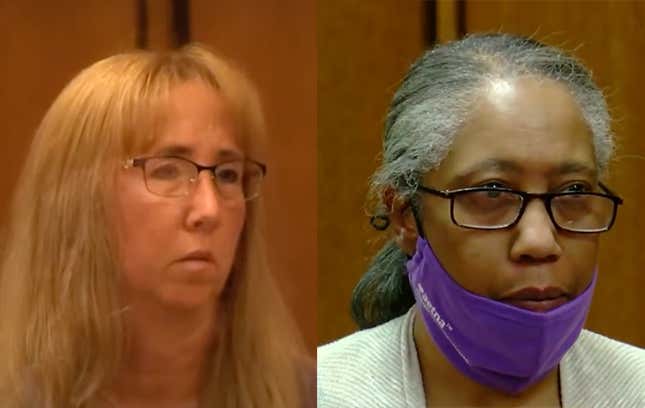
While the above headline may seem incendiary, it is important not to draw false equivalencies because all criminal cases are not equal. For example, in this specific story, two women—one Black, one white—were convicted of the exact same crime. However, the two cases are not the same. One is worse than the other.
According to the Plain Dealer, On August 2, former Chagrin Falls, Ohio Village Clerk Debbie Bosworth pleaded no contest to 22 counts of theft in office, tampering with records and money laundering after auditors discovered she had embezzled more than $238,000 over the span of 20 years. The Cuyahoga County Prosecutor’s Office rejected the 53-year-old Bosworth’s plea and asked a judge to sentence her to prison, even though she wrote a check for $100,000 to repay part of her debt when her scheme was uncovered.
But Bosworth is white, as is Cuyahoga County Common Pleas Court Judge Hollie Gallagher. And in the history of America, there isn’t one documented case of a “Hollie” sending a “Debbie” to prison (yes, we actually checked). So, Gallagher, citing the fact that Bosworth paid back some of the money she stole, sentenced her fellow white woman to two years probation, much to the chagrin of Cuyahoga County Prosecutor Michael O’Malley, who issued a statement saying he found the sentence “to be unacceptable in that he believes public employees who steal from taxpayers should go to prison.”
The very next day, Assistant Cuyahoga County Prosecutor James Gutierrez—the same assistant district attorney who prosecuted Bosworth—recommended a prison sentence for 51-year-old former school secretary Karla Hopkins for stealing $40,000 from Maple Heights High School. Although Hopkins appeared before the exact same court, Hopkins’ judge was a white man, Cuyahoga County Common Pleas Court Rick Bell. Unlike Bosworth, Gallagher pleaded guilty. Unlike Bosworth, Hopkins was only charged with one count of theft in office. Unlike Bosworth, Hopkins had already found a new job, completed an in-patient program for her gambling addiction and had promised to repay the money she stole.
The Plain Dealer reports:
Hopkins told Bell that she emptied her pension — she didn’t know how much was in it but said, after taxes, she received about $20,000 — to pay her bills after the school fired her. Her attorney, Bret Jordan, said that she began stealing the money while dealing with mental health issues and her gambling addiction but has since gotten treatment and gone through a job placement program. In the meantime, she came up with $5,000 to pay toward her restitution.
Assistant Cuyahoga County Prosecutor James Gutierrez, like Brydle did with Bosworth, sought a prison sentence for Hopkins. He told Bell that the state would be fine with a sentence of between nine and 12 months.
Bell scolded Hopkins for taking her pension money, and sentenced her to 18 months in prison — six more months than Gutierrez requested.
Neither judge could comment on their sentences but Cleveland activists immediately decried the disparity in the two sentences. The white woman committed more crimes, over a longer period of time. She stole more money than the Black woman. She had 21 more charges and cost taxpayers six times more money. She was facing 60 years in prison while the Black woman’s maximum sentence was three years. Yet the Black woman received more prison time than prosecutors wanted her to spend in jail.
“I think it reinforces the lack of trust in the justice system,” said Danielle Sydnor, president of Cleveland’s NAACP chapter. “These types of things are the way the system was designed, and they will continue to happen if we don’t have large-scale reform.”
Nationwide, Black people convicted of crimes received 20 percent longer sentences than similarly situated whites who commit the same offenses, according to the U.S. Sentencing Commission. In Ohio, the state’s Black residents are imprisoned at 6 times the rate of Ohio’s white residents, according to the Sentencing Project. In 1999, a report from the Commission on Racial Fairness found that Black Ohioans are sentenced to prison at grossly disproportionate rates compared to their white counterparts. The study, requested by the Chief Justice of the Ohio Supreme Court, determined that “the consensus of the available research acknowledges that minorities are more frequently sentenced to prison and generally receive harsher penalties than do whites.”
In 2020, a different Ohio Supreme Court Justice, along with the Ohio Sentencing Commission, launched a push to create the Ohio Sentencing Data Platform, which would collect data from the state’s criminal courts. The judges could voluntarily use the database to show the average sentences for similar cases instead of depending on their own individual perceptions. However, many judges in the state refused to even sign up for the program, citing the need for judicial discretion.
Of the 34 Cuyahoga County Common Pleas Court’s judges, only ten said they plan to use the program, six of whom are serving their first term.
Cuyahoga County has the highest percentage of Black residents in Ohio.

